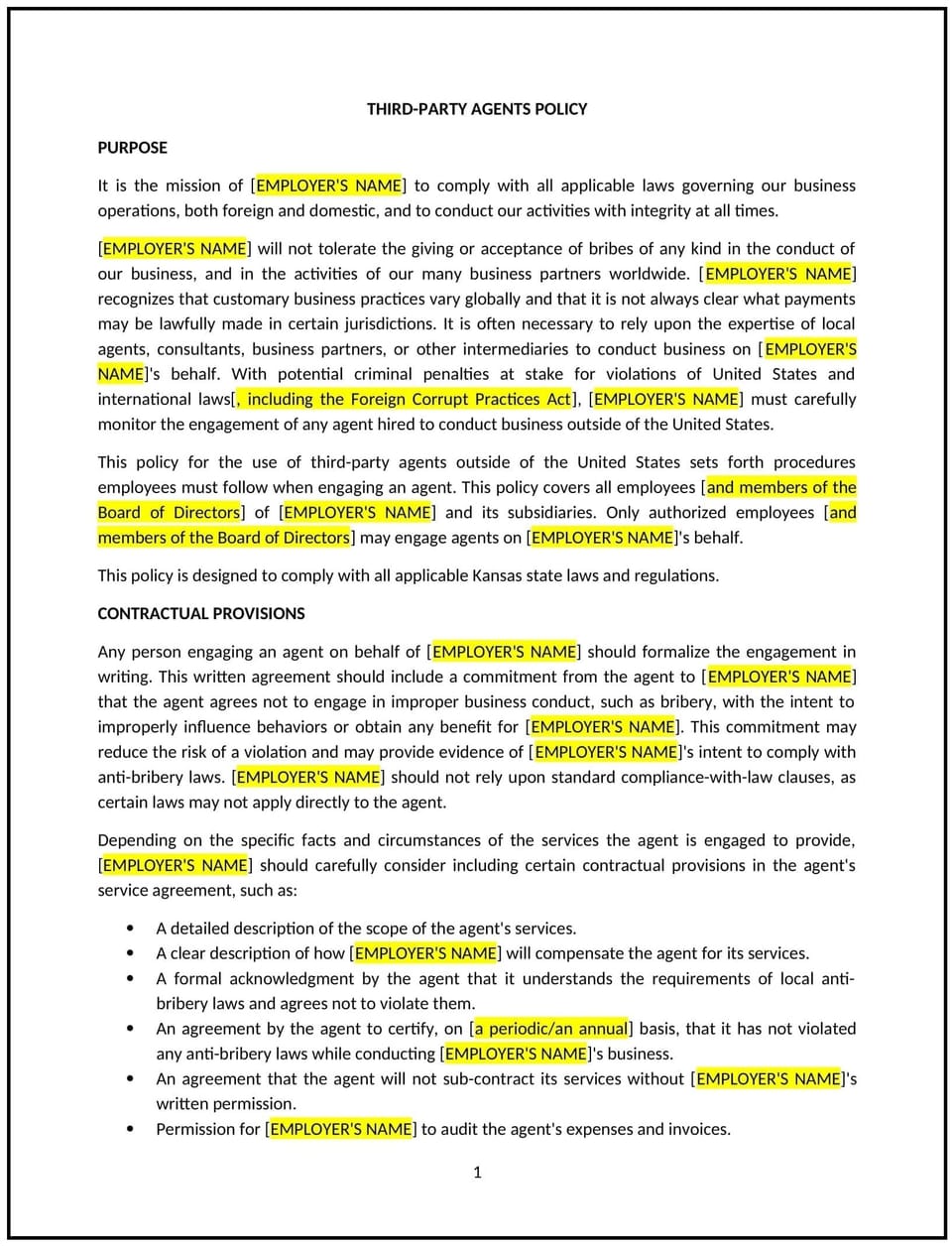Third-party agents policy (Kansas): Free template

Third-party agents policy (Kansas)
A third-party agents policy helps Kansas businesses manage relationships with external contractors, vendors, and service providers. This policy outlines the expectations, guidelines, and responsibilities for engaging third-party agents to ensure that business operations are conducted ethically, in compliance with legal requirements, and in line with company standards.
By implementing this policy, businesses can minimize risks associated with third-party relationships, protect their reputation, and ensure consistent quality and ethical practices in their operations.
How to use this third-party agents policy (Kansas)
- Define third-party agents: The policy should define what constitutes a third-party agent, including contractors, vendors, suppliers, consultants, and any external party engaged in business activities on behalf of the company.
- Set criteria for selection: Businesses should establish criteria for selecting third-party agents, including the evaluation of qualifications, reputation, financial stability, and adherence to the company’s values and standards.
- Outline responsibilities and expectations: The policy should specify the roles and responsibilities of third-party agents, including their obligations to meet performance standards, comply with applicable laws, and follow the company’s ethical guidelines.
- Address confidentiality and data protection: Businesses should outline the confidentiality requirements for third-party agents, ensuring that they safeguard proprietary or sensitive company data, trade secrets, and customer information.
- Specify terms of agreements: The policy should require that formal agreements be in place with third-party agents, specifying terms such as the scope of work, payment terms, confidentiality clauses, and performance expectations.
- Establish monitoring and oversight procedures: Businesses should implement mechanisms for monitoring the performance of third-party agents and ensuring that they meet agreed-upon standards and comply with contractual terms.
- Define termination procedures: The policy should outline the steps for terminating a relationship with a third-party agent if performance is unsatisfactory, contractual obligations are violated, or the agent fails to adhere to ethical or legal standards.
- Review and update regularly: The policy should be reviewed periodically to ensure it aligns with evolving business needs, legal requirements, and industry best practices.
Benefits of using a third-party agents policy (Kansas)
- Mitigates business risks: A clear third-party agents policy helps businesses reduce the risk of legal, financial, or reputational damage that can arise from poor third-party performance or unethical practices.
- Promotes accountability: By setting clear expectations and responsibilities, businesses can hold third-party agents accountable for their actions, ensuring that they align with the company’s standards and goals.
- Protects sensitive information: Confidentiality clauses and data protection protocols in the policy help safeguard proprietary company information, intellectual property, and customer data from unauthorized access or misuse.
- Improves business relationships: By clearly defining the terms of engagement, businesses can foster strong, positive relationships with third-party agents, which can lead to improved collaboration and business outcomes.
- Enhances regulatory compliance: The policy helps ensure that third-party agents comply with applicable laws and industry regulations, reducing the likelihood of legal violations or penalties.
- Increases operational efficiency: With clear guidelines and performance standards in place, businesses can ensure that third-party agents perform their duties effectively, helping to streamline operations and improve productivity.
Tips for using this third-party agents policy (Kansas)
- Communicate the policy clearly: Businesses should ensure that all third-party agents are informed of the policy and understand their obligations, responsibilities, and performance expectations.
- Conduct due diligence: Before entering into agreements with third-party agents, businesses should thoroughly vet them for qualifications, experience, and reliability, ensuring they are a good fit for the company’s needs.
- Regularly review agent performance: Businesses should monitor and assess the performance of third-party agents regularly to ensure they are meeting contractual obligations and providing the expected value.
- Include dispute resolution procedures: The policy should outline steps for resolving conflicts or disagreements with third-party agents, such as mediation or arbitration, to avoid costly legal battles.
- Foster transparent communication: Businesses should encourage open, honest communication with third-party agents, addressing concerns or issues promptly to maintain strong relationships.
- Review and update the policy periodically: Businesses should review the third-party agents policy at least annually or when there are changes to the legal landscape, business needs, or industry best practices.
Q: Why should Kansas businesses implement a third-party agents policy?
A: Businesses should implement a third-party agents policy to manage relationships with external agents effectively, reduce risks, ensure ethical practices, and maintain operational standards and legal compliance.
Q: How do businesses select third-party agents?
A: The policy should specify criteria for selecting third-party agents, including evaluating their qualifications, reputation, financial stability, and ability to meet the business’s standards and needs.
Q: What responsibilities do third-party agents have?
A: Third-party agents should be responsible for fulfilling the terms of their agreements, adhering to performance standards, maintaining confidentiality, and complying with applicable laws and ethical guidelines.
Q: How should businesses monitor the performance of third-party agents?
A: The policy should include provisions for monitoring third-party agent performance, such as regular evaluations, audits, or performance reviews, to ensure that agents are meeting expectations and contractual terms.
Q: What happens if a third-party agent violates the terms of the agreement?
A: The policy should outline the steps businesses can take to address violations, including corrective actions, contract termination, or legal remedies, depending on the severity of the breach.
Q: Are third-party agents required to maintain confidentiality?
A: Yes, the policy should require that third-party agents sign confidentiality agreements to protect sensitive business data, proprietary information, and customer data from unauthorized access or misuse.
Q: How often should businesses review and update their third-party agents policy?
A: Businesses should review and update the policy regularly, at least annually, or when there are changes in legal requirements, business needs, or industry practices to ensure it remains relevant and effective.
This article contains general legal information and does not contain legal advice. Cobrief is not a law firm or a substitute for an attorney or law firm. The law is complex and changes often. For legal advice, please ask a lawyer.


